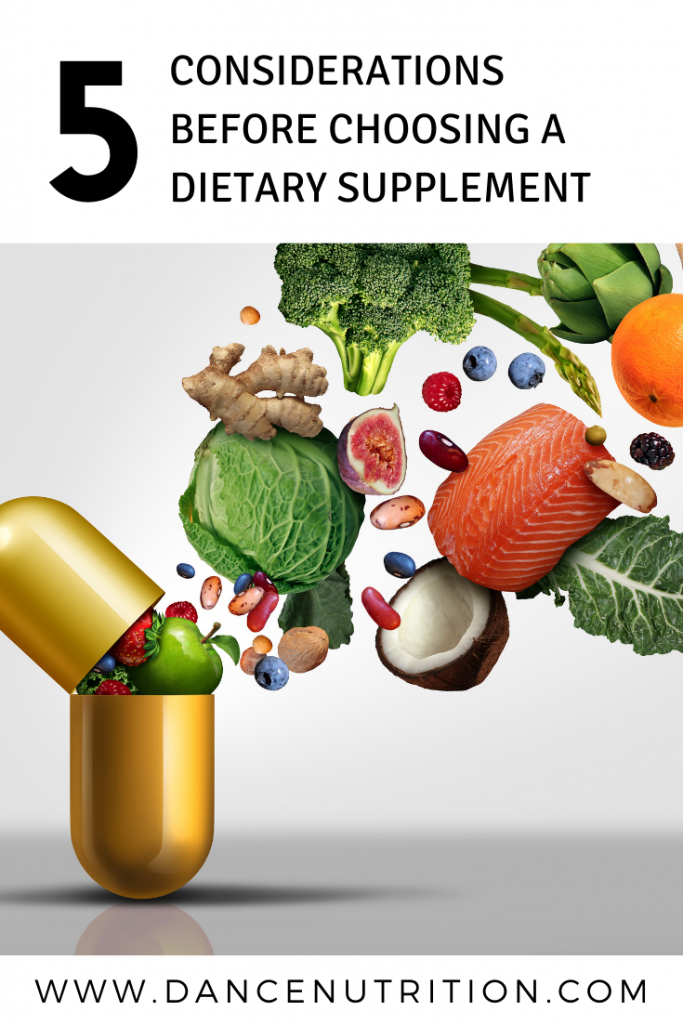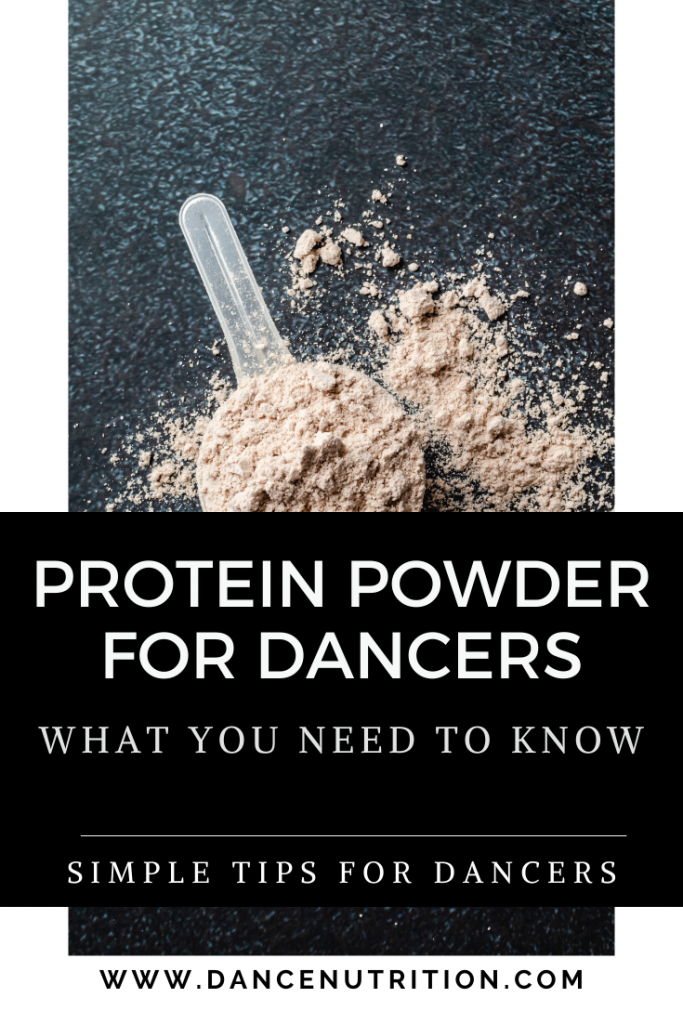At some point along with your dance training, you’ve likely heard about supplements. This article will review everything dancers need to consider about dietary (nutrition) supplements, including what they are and whether or not they’re needed.
What is a dietary supplement?
The term “dietary supplement” is defined and regulated differently worldwide. In the US, the FDA defines dietary supplements as “a product intended to supplement the diet.” These products contain ingredients — vitamins, minerals, herbs, botanicals, and protein isolates. Dietary supplements can come in various forms, including foods (like energy bars), drinks, powders, capsules, and tablets.
Compared to medication prescribed for disease treatment or management, dietary supplements are often marketed as the option that prioritizes disease prevention. Marketing from the supplement industry illustrates proposed promises to “fix,” “correct,” or “prevent” disease. But here’s what’s interesting: dietary supplements represent a multi-billion-dollar industry with an estimated net worth of $37.2 billion in 2022. Globally, the industry is expected to reach a market value of 185.1 billion U.S. dollars in 2025. With a budget that big, the supplement industry, arguably, must have a similar agenda to big pharma: to sell.
What’s the issue?
One word: regulation (or lack thereof).
Though recognized and defined by the FDA, the supplement industry is largely unregulated. Much of this dates to the 1970’s with the FDA receiving backlash for proposing limits on the amount of vitamins and minerals that could be added to various foods. After years of debate, the Dietary Supplement Health and Education Act (DSHEA) was enacted in 1994— largely due to lobbying efforts from the supplement industry. This law prohibits the FDA from regulating supplement manufacturers from using ingredients that haven’t yet been deemed safe. Yep, it’s illegal for the FDA to review supplements for safety or efficacy before they go to market. In other words, the safety of supplements lies in the hands of the manufacturer, not the FDA. Because of this, supplements can claim nearly anything without having sufficient scientific evidence to support the claim.
What’s the evidence?
In 2016, the New York Times published an article revealing the concerning truth of conflicting research surrounding supplements concluding that “…a cautionary approach to supplements is wise.” A 2015 article uncovered an alarming number of hospitalizations related to supplement use, mainly herbs, and botanical supplements.
Most recently is a 2022 review analyzing 84 studies concluding that vitamin and mineral supplementation provides little to no benefit in preventing cancer, heart disease, or death. The study suggests only a small benefit in reducing the incidence of cancer (particularly lung cancer) with multivitamin use. And last, some supplements were even shown to increase one’s risk of certain diseases.
Do dancers need supplements?
It’s important, however, to consider the needs of dancers as comparable to those of athletes. If not consuming a well-rounded meal plan sufficient in calories and nutrients, dancers risk developing key micronutrient and macronutrient deficiencies. Given the common “eat less” mentality of dancer diet culture, dancers often attempt to reduce food intake to control their weight. These restrictive eating behaviors can risk deficiencies in:
Micronutrients:
- Vitamin D
- Calcium
- Iron
- Zinc
- B Vitamins
- Vitamin E
Macronutrients:
- Fat (specifically omega-3 fatty acids)
- Carbohydrates
- Protein
A resulting need to maintain nutrient status further translates into an over-dependence on dietary supplements, which act as an insurance policy for nutrients that might be missing from the diet. While supplements may be medically necessary for certain populations (like during pregnancy) or those following restricted diets (like veganism), a well-planned and food-first approach is key.
Before deciding whether or not you can benefit from a nutrition supplement, consider the following:
#1: Make an Informed Decision
Whether or not you will benefit from a supplement depends on individual circumstances like diet and lifestyle. You’ll need to weigh the pros and cons:
The Pros of Supplements
- Supplements can help dancers and athletes “fill in the gaps” if and when certain vitamins or minerals are lacking in one’s diet.
- Supplements (like electrolyte-infused drinks) can help dancers and athletes hydrate optimally.
- Supplements can be used to address or prevent a medically diagnosed nutrient deficiency.
The Cons of Supplements
- Supplements are often expensive and have side effects, such as constipation from iron tablets.
- The supplement industry is poorly regulated and some may contain ingredients that are undeclared or even considered dangerous contaminants.
- Some supplements contain ingredients prohibited by the anti-doping codes of sports nutrition.
#2: Know When A Supplement Might Be Necessary
The evidence supporting the use of supplements to enhance an athlete or a dancer’s performance is extremely limited to short-term results and anecdotal reports. There are some instances however when supplements might be necessary to support underlying deficiencies. To assess whether or not you need a supplement, consider these two questions:
Am I already consuming enough of this nutrient regularly?
First, avoid self-diagnosing nutrient deficiencies. Always consult with a licensed medical professional. A trusted doctor can perform a simple blood test to identify potential deficiencies while a Registered Dietitian Nutritionist can help analyze your current intake to see which habits might be contributing to the insufficiency and what foods might be excluded from your diet. If adequate intake is not practical through diet alone, supplements might help. Among dancers, vitamin D, and iron are two nutrients that often present deficiency.
How can I modify my food choices to obtain enough of this nutrient?
Supplementation can lead to an expensive new habit. A few tweaks to your daily food intake might be all that is needed to correct an underlying nutrient deficiency. Vitamin C and calcium are two common examples. Increasing your intake of fruits, veggies, and dairy products (or dairy alternatives) can easily improve your nutrient status of both vitamin C and calcium.
For dancers specifically, a well-planned diet should ensure sufficient caloric intake and adequate intake of Vitamin B12, Vitamin D, omega-3 fatty acids, calcium, iron, and zinc.1 Food preferences (such as a vegan lifestyle), allergies (such as a gluten-free lifestyle), and religious practices can result in the regular omittance of certain foods and therefore be a reason for supplementation. For example, since vegan diets lack food sources high in iron and vitamin B12, it’s encouraged that vegan dancers refer to resources for plant-based meal planning.
#3: Consider the Industry

Assessing the safety and efficacy of your supplements is important. Ask yourself: is there strong and substantial evidence that supports the use of supplement XYZ to help me with issue XYZ? Caution with using Google to research this on your own. Consulting with a Registered Dietitian Nutritionist is encouraged. A Certified Specialist in Sports Nutrition can access and translate scientific jargon into digestible information. Furthermore, third-party testing (such as BSCG Certified Drug-Free, Informed-Choice (or Informed-Sport), NSF Certified for Sport, and USP Verified) ensures that the supplement in hand is free of banned substances.
#4 How About a Daily Multivitamin?
A daily multivitamin can help to “fill the gaps” of any potential nutrients missing from a dancer’s diet. Since multivitamins and other supplements don’t contain the intact fibers and biochemical markers that whole fruits and veggies provide, you’ll still want to prioritize an abundance of fruits & veggies in your weekly meal plan. This is especially true for “Super Greens” and “Green Powders.” Most are expensive and lack the intact nutrients found in whole vegetables. Here are a few helpful articles that dive into balanced meal planning for dancers:
#5: How About Protein Powders?
While no evidence supports the use of protein powders to enhance your muscle’s response to training, protein powders can be a reliable way to support a dancer’s recovery if busy schedules make it tough to incorporate adequate amounts of high-protein foods throughout the day.
To learn more about protein supplements for dancers, click here. Utilizing a food-first approach is always encouraged and will be your most economical option. Eating a variety of protein-rich foods throughout the day (such as beans, lentils, poultry, fish, eggs, yogurt, nuts, and seeds) can meet a dancer’s protein needs without relying on expensive supplements. If you are considering a supplement, choose a third-party tested plant or whey protein powder and aim for no more than one supplement per day or a few per week.
The Bottom Line:
Generally, supplements are unnecessary if your diet is well-planned and consists of a variety of plant-based or animal-based whole foods. Calorically restrictive diets can risk deficiencies that diminish health and ultimately performance. On the flip side, taking mega doses of one vitamin or mineral can result in deficiency of another, simply because the two compete for absorption. Before starting any new supplement, ask a medical professional, such as a licensed Registered Dietitian Nutritionist for advice.
Dietary Supplements for Dancers- Everything You Need to Know
Click the image below for a free 7-day trial.


References:
- Brown DD. Nutritional Considerations for the Vegetarian and Vegan Dancer.J Dance Med Sci. 2018 Mar 15;22(1):44-53.



